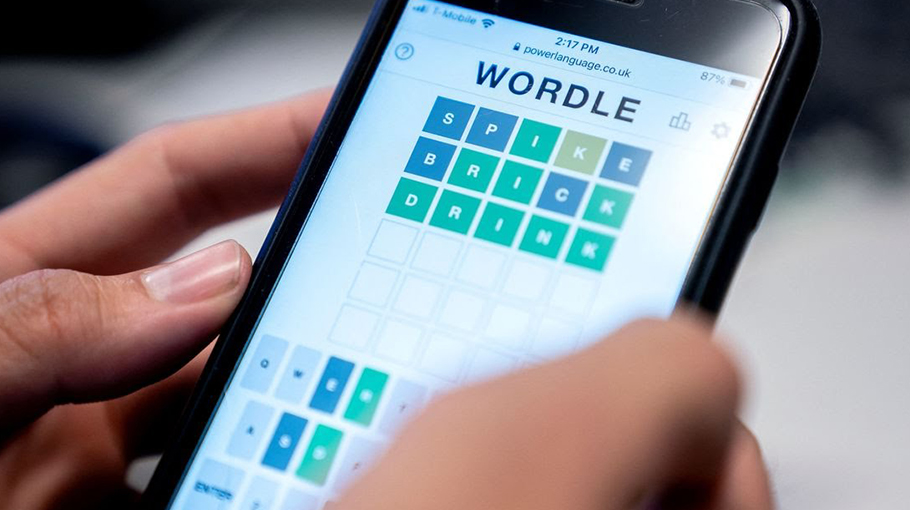Wordle is the word: A logophile’s paean

“In the beginning was the Word.” John was exaggerating in his Gospel — there had been rather a lot going on even before words. But he was on to something. Whenever humanity took a leap, words weren’t far.
They first became the Next Big Thing during the Stone Age. Once we started enunciating and understanding words — rather than just grunting or howling at one another — we had a clear edge over the neighbors.
In the Bronze Age, we took it up a notch, with written words. Admittedly, the user interface of the beta versions — from hieroglyphics to cuneiform — left much to be desired. But once the Phoenicians launched Alphabet 2.0, they set the rest of us on a trajectory that remains as impressive as the arc of Moore’s Law in another context.
Notable innovators included the likes of Johannes Gutenberg. The Chinese had dabbled in movable type, but it was the German goldsmith who got us properly into printing words — and thus into mass-producing as well as mass-consuming them.
Sometimes, innovation went retro, by giving us new ways of hearing words. Around the time we discovered distance writing (that is, the tele-graph), we also figured out how to hear distant voices (through tele-phones). In our own WhatsApp era, all these word forms — spoken, written, hieroglyphic in the form of emoticons — are in flux. Where that mash-up leads, FWIW, remains unclear.
What I’m really saying is that words deserve more respect. We fight
about them because we care about them, because they matter. We need
our words to be fully human. That also means we need them to play
Which brings us to the bigger point about words. They can be the most beautiful things in the world, but also the ugliest. For every beacon of logophilia (love of words), there have always been countless victims of logophobia (fear of words, although that’s not actually a word) or logorrhea (think of diarrhea).
For the logophiles — from Shakespeare to Webster, Tolkien or Seuss — English is a particular treasure chest, because it’s just got so darn tootin’ many words. There are the punchy, short Germanic ones from the Anglo-Saxons, and also the longer, fancy French ones from the Normans.
And then all the rest, from Arabic (as in algebra) to Persian and Urdu (khaki).
But make this ammo available to the armies of logophobia and logorrhea, and the result becomes unspeakable and unreadable. Politicians and PR types use words to produce evasive Orwellian gibberish. Snowflakes and the Woke treat words — starting, but not ending, with pronouns — as pitchforks for revolution.
Their foes on the opposite side escalate by corrupting words into dog whistles of prejudice. On it goes, down it goes, into the gutter.
Atrocities against the Word don’t even have to be political. A horrible meta-ideology has crept into linguistics that I’ll call anything-goes. It’s the syntactical equivalent of anarchy, where there’s no difference between me and I, who and whom, as and like, lie/lay/lain and lay/laid/laid. I’ll bet these preachers of laissez-faire would rediscover such nuance quickly if they had to decide between being hung and hanged.
Language changes, they say. Yes, it does. There was a time when, if you were sick, you’d go to a leech (doctor); and if you prayed a lot, you were silly (pious).
But change must be gradual, organic and digestible — evolutionary, not revolutionary. During transitions, rules still matter, like decorum.
What I’m really saying is that words deserve more respect. We fight about them because we care about them, because they matter. We need our words to be fully human. That also means we need them to play.
Oh, I like my occasional Sudoku and Ken Ken, like the rest of you. But numbers don’t have the soul of words. So give me my Scrabble, Boggle and Bananagrams. Give me a punny crossword. Or, like the New York Times, invent delights like Spelling Bee.
It’s a digital hive of seven letters, out of which you make as many words as possible. If you’re good, they call you genius; if you’re great, they make you Queen Bee. Everyone in my family wants to be that.
So it was great to add another addiction recently. In October, a software engineer in Brooklyn launched a new word game. His name is Josh Wardle, so it was inevitably named Wordle. You get six tries to guess a five-letter word, with a few colorized hints.
Like a true logophile, Wardle made the game for “an audience of 1,” as he puts it. It’s now played by millions every day, including me. There’s even a Chinese version, getting around the problem with characters by using pinyin (see: problems with hieroglyphics and cuneiform, above).
Wordle has everything modern humans crave. First: simplicity. The rules take seconds to learn. Second: depth.
The intuition takes lifetimes to master. Third: deniability. My editor thinks I’m working while I’m at it. And finally, the clincher: words.
This week, Josh Wardle sold Wordle to the New York Times. They were rather coy about the amount, but it seems to be a packet. Good for you both. You deserve it. Everyone from the Phoenicians to Gutenberg to John the Evangelist is green with envy. Maybe the word was not the beginning. But — teleologically — it just may be the end.
Andreas Kluth is a Bloomberg Opinion Columnist.
Source: Bloomberg



